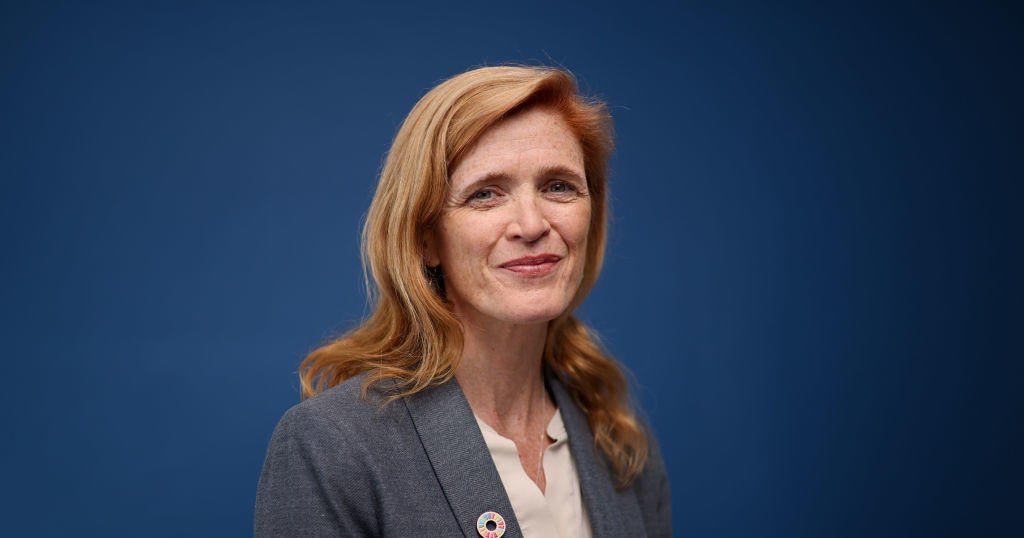
The top U.S. official in charge of international development condemned the alleged involvement of employees of the United Nations Relief and Works Agency (UNRWA) in Hamas’ attack on Israel this fall that left over 1,200 people dead and hundreds taken hostage.
“Anybody who was involved in the Oct. 7 attack and the brutality and the planning of it, and the execution of it, in kidnappings, not only deserves condemnation, but also punishment,” United States Agency for International Development (USAID) Administrator Samantha Power told chief Washington correspondent Major Garrett on this week’s episode of “The Takeout.”
The Israeli government alleges that at least a dozen employees of the U.N. agency responsible for assisting Palestinian civilians played a role in the attack by Hamas. The U.N. has launched an investigation, and over a dozen countries, including the U.S., have paused funding to the agency. Nine of the employees have been fired, one was confirmed dead, and the U.N. is still working to identify the other two.
“And so what the U.N. has commenced, which is an internal investigation into these allegations, which do seem credible, but we will see how this investigation plays out, I mean, that’s incredibly important,” said Power. “And then the question of what to do with these individuals on the back end of that, but more than that, the systemic changes that would need to be made within UNRWA, because this is just not okay, it’s just — nothing okay about this.”
Power acknowledged the difficulties of ensuring accountability in this case and addressing systemic failures that allegedly allowed this to happen. At the same time, Palestinian civilians desperately need the aid deliveries, and USAID, other countries and aid organizations providing humanitarian assistance to Palestinians rely on UNRWA to distribute the aid to refugees. Of the 13,000 UNRWA staff employed in Gaza, 3,000 continue to report to work. More than 150 UNRWA staff have been killed in Gaza since the fighting began.
“You have 90% of the Gazan population that has been displaced,” Power said, adding that there is “acute dependence” on the humanitarian infrastructure” provided by UNRWA.
Power said humanitarian and commercial traffic into Gaza must be dramatically expanded to meet the need for aid delivery. “Nobody is turning their back on the people of Gaza,” she said. “Quite the contrary, we’re looking at, again — what will it take to be in a position to be surging assistance and going far beyond where we’ve gone to this point?”
Ukraine aid and Congress
Power also addressed the contentious talks in Congress over the supplemental funding package that includes over $60 billion in additional assistance for Ukraine. “This supplemental package is vitally needed,” Power said. “It is not a blank check. It is tailored resources to not only help Ukraine fend off this brutal, brutal aggression, take back more of its territory….But it is an investment as well, long-term, in Ukraine being an ally to the United States that will help us in other parts of the world stand up for democratic principles and against aggression.”
She also pointed out that the U.S. is not alone in providing substantial security assistance to Ukraine, noting that European countries are carrying a substantial burden. She suggested that the ratio of U.S. assistance to European Union and Britain’s support is as high as 55:45 or 60:40, “depending on when you’re counting.”
Power said that ratio is increasing in Europe’s favor, as it continues to provide military assistance while U.S. packages have been shrinking because Congress is still gridlocked over supplemental funding legislation. She said that providing aid to Ukraine constitutes an investment in its self-sufficiency, and she praised the EU’s recent agreement to start accession talks with Ukraine.
The world is watching to see whether or not Congress will be able to pass funding, Power said: “The only actors on the global stage who will be jumping up and down with delight if we fail to move our security and our economic and humanitarian package forward are individuals in Moscow, Tehran, and probably Beijing…and Pyongyang, as well.”
Executive producer: Arden Farhi
Producers: Jamie Benson, Jacob Rosen, Sara Cook and Eleanor Watson
CBSN Production: Eric Soussanin
Show email: TakeoutPodcast@cbsnews.com
Twitter: @TakeoutPodcast
Instagram: @TakeoutPodcast
Facebook: Facebook.com/TakeoutPodcast
